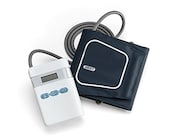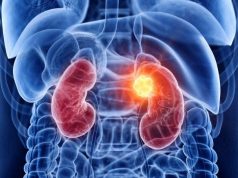Strict BP control, fenofibrate use may increase long-term risk for adverse kidney events in T2DM patients
THURSDAY, Nov. 1, 2018 (HealthDay News) — Intensive blood pressure (BP) control and fenofibrate use in patients with type 2 diabetes who are at high risk for cardiovascular disease may increase the risk for adverse kidney events, according to a study published in the Clinical Journal of the American Society of Nephrology to coincide with its presentation at the American Society of Nephrology’s Kidney Week, held Oct. 23 to 28 in San Diego.
Amy K. Mottl, M.D., M.P.H., from the University of North Carolina at Chapel Hill, and colleagues evaluated the long-term kidney effects of aggressive control of glycemia (hemoglobin A1c <6 percent), blood pressure (systolic BP <120 mm Hg), and lipids among participants in the Action to Control Cardiovascular Risk in Diabetes (ACCORD) study. ACCORD was a multifactorial intervention in 10,251 people with type 2 diabetes at high risk for cardiovascular disease.
The researchers found 988 cases of incident macroalbuminuria, 954 with doubling of creatinine, 351 requiring dialysis, and 1,905 deaths, all of which constituted the primary composite outcome. Compared with standard therapy, the hazard ratios (HRs) for the composite outcome were 0.92 for intensive glycemic control, 1.16 for intensive BP control, and 1.16 for fenofibrate use. A secondary outcome analysis that accounted for the risk for death in incident kidney outcomes showed that in the glycemia trial, only macroalbuminuria was significantly decreased (HR, 0.68). Only creatinine doubling was affected in the BP and lipid trials (HR, 1.64 and 2, respectively).
“In people with type 2 diabetes at high risk for cardiovascular disease, intensive glycemic control may result in a long-term reduction in macroalbuminuria; however, intensive BP control and fenofibrates may increase the risk for adverse kidney events,” conclude the authors.
The authors of an accompanying editorial wrote that the observation of doubling of serum creatinine does not suggest harm to the kidneys but was likely due to the limitations caused by the small number of available creatinine measurements. “We believe that the data actually suggest possible benefit for ESKD [end-stage kidney disease] with intensive glucose control, and remain inconclusive for intensive blood pressure control and fibrate use given the wide confidence intervals for the more reliable ESKD outcomes,” they wrote.
Several authors disclosed financial ties to the pharmaceutical industry.
Abstract/Full Text (subscription or payment may be required)
Editorial (subscription or payment may be required)
More Information
Copyright © 2018 HealthDay. All rights reserved.








